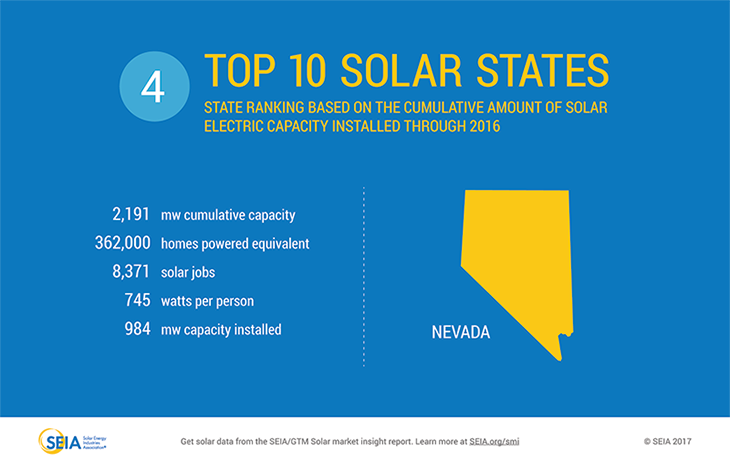 Loading... Please wait...
Loading... Please wait...Products
- Solar Panels
- Solar Panel Kits
- Solar Generators
- Inverters
- Inverter Monitoring
- Inverter Accessories
- Balance of Systems
- Racking and Mounting
- Rails
- Flashings
- Splice Kits
- Stopper Sleeves
- Conduit Mounts
- Attachments
- Brace Assembly
- Base Mount
- Brackets
- Bolts
- Clamps
- Caps
- L-Feet
- Washers
- Skirt
- Lugs
- Tilt Legs
- Hooks
- Stand-Offs
- Ballast Bay
- Top of Pole Mount
- Side of Pole Mount
- Flush Mount Kits
- Ground Mount Kits
- Roof Mount Kits
- Hardware Packages
- Wire Management
- Batteries
- Battery Accessories
- Charge Controllers
- Tools and Supplies
- View All Products
Solaris Blog - Nevada Solar Energy Incentives.
Net Metering May Return to Nevada
Posted by Brandi Casey on 10th Jun 2017

The state of Nevada is home to more than just entertainment and casinos, with five to five and a half hours of peak sunlight it is also a prime location for solar energy. However, due to the 2015 legislation that crippled net metering, many manufacturers and installers such as Vivint Solar and Sunrun pulled out of the state. While the measure did not kill solar energy in Nevada, it did assist in crippling solar energy growth.
According to SEIA Nevada is currently ranked at 4th
place in cumulative solar electric capacity installed through 2016 at 2,191
megawatts and approximately 362,000 homes. They trail behind California at
18,296 megawatts and 4,732,00 homes, North Carolina at 3,016 megawatts and
341,00 homes; and Arizona at 2,982 megawatts and 446,00 homes. In terms of
solar energy jobs, the Nevada also ranks 4th at 8,371 solar energy
jobs, and has did not increase their solar energy capacity from 2015 to 2016 to
make the top ten list. However, in terms of solar capacity per capita, the
state ranks number one at 745 watts per person which is a strong indicator for
the potential the state holds to carry a high energy capacity.

Luckily, positive news has come to the state in the form of Assembly Bill 405 which seeks to revive the net metering program in the state. Governor Brian Sandoval is expected to sign the bill next week that will set new rates for the excess power generated by home and business owners. The bill will not only assist in increasing solar installations, and consumer ROI but is already making waves in the industry and encouraging businesses to come back to the state. The president of policy for Sunrun announced that prior to the previous bill that removed net metering the company had hundreds of employees and a warehouse in Las Vegas; and that the company will come back to Las Vegas after the bill has been signed. As of now, no timeline has been presented on when that will be or how long it will take to get up and running, however the company serves as a sign that companies are likely to return to the state.
With the underutilized resources in Nevada the bill comes as a welcome relief to current consumers who have not benefited from net metering for the last year and a half. While net metering is not the only selling point of solar, it is a factor to consider when calculating your ROI period. The lack of net metering also encouraged many homeowners to switch to hybrid systems with costly battery back-up systems. While hybrid systems are beneficial, the battery banks can make it slightly unobtainable for many consumers. In combination with the unavailability of net metering, the lack of options for a faster ROI has encouraged many consumers to not move forward with installing renewable energy.
We look forward to seeing the fast increase in solar arrays in Nevada over the next year. The rise of renewable energy installations is sure to follow. With the mass amount of power Las Vegas consumes on even a nightly basis relying on a renewable energy source is sure to assist the state to become more green and efficient.



